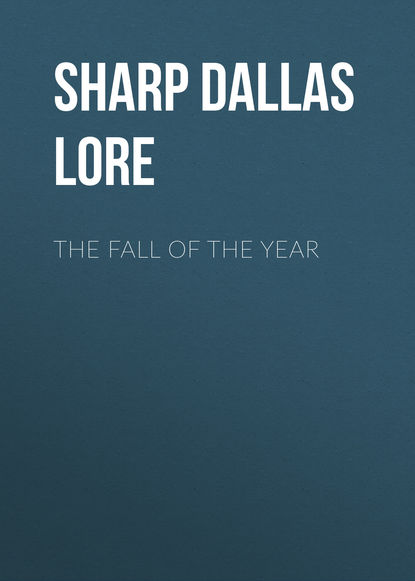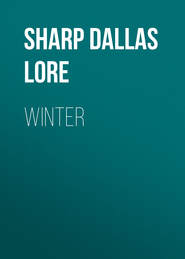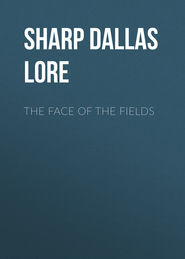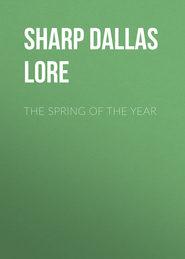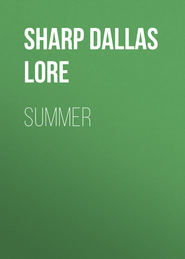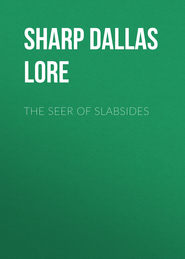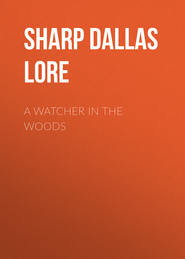По всем вопросам обращайтесь на: info@litportal.ru
(©) 2003-2024.
✖
The Fall of the Year
Настройки чтения
Размер шрифта
Высота строк
Поля
TO THE TEACHER
The thought in this chapter is evident, namely, that love for the out of doors is dependent upon knowledge of the out of doors. The more we know and the better we understand, the more perfect and marvelous nature seems and the more lovely. The toadfish looks loathly, but upon closer study he becomes very interesting, even admirable – one of the very foundations of real love. So, as a teacher and as a lover of nature, be careful never to use the words “ugly” or “nasty” or “loathly”; never shrink from a toad; never make a wry face at a worm; never show that you are having a nervous fit at a snake; for it all argues a lack of knowledge and understanding. All life, from Man to the Amœba, is one long series of links in a golden chain, one succession of wonderful life-histories, each vastly important, all making up the divinely beautiful world of life which our lives crown, but of which we are only a part, and, perhaps, no more important a part than the toadfish.
FOR THE PUPIL
The toadfish of this story is Batrachus tau, sometimes called oyster-fish or sapo. The fishing-frog or angler is by some called toadfish, as is also the swell-fish or common puffer of the Atlantic Coast.
Page 21
Buzzards Bay: Where is Buzzards Bay? Do you know Whittier’s beautiful poem, The Prayer of Agassiz, which begins: —
“On the isle of Penikese
Ringed about by sapphire seas.”
Where is Penikese? What waters are those “sapphire seas,” and what was Agassiz doing there?
Page 23
Davy Jones: Who is Davy Jones? Look him up under Jones, Davy, in your dictionary of Proper Names. Get into the “looking up” habit. Never let anything in your reading, that you do not understand, go unlooked up.
Old Man of the Sea: Look him up too. Are he and Davy Jones any relation?
It was really a fish: What names do you think of that might fit this fish?
Page 24
coarsely marbled with a darker hue: What is the meaning of marbled?
Page 25
covered with water: The author means that the rock is not always covered with water, not the hole under the rock. Of course the hole is always built so that it is full of water, else the fish would perish at low tide.
Page 27
love the out of doors with all your mind: Do you know what is meant by loving the out of doors with your mind? Just this: that while you feel (with your heart) the beauty of a star, at the same time you know (with your mind) that that particular star, let us say, is the Pole Star, the guide to the sailors on the seas; that it is also only one of a vast multitude of stars each one of which has its place in the heavens, its circuit or path through the skies, its part in the whole orderly universe – a thought so vast and wonderful that we cannot comprehend it. All this it means to love with our minds. Without minds a star to us is only a point of light, as to Peter Bell
“A primrose by the river’s brim
A yellow primrose was to him
And it was nothing more.”
Does the toadfish become anything more than a mere toadfish in a shoe before the end of the chapter?
Page 28
in the toadfish’s shoe: What does the author mean by asking you to put yourself in the toadfish’s shoe? Only this: to try, even with the humblest of creatures, to share sympathetically their lives with them. The best way to do this with man as well as with toadfish is to learn about their lives.
CHAPTER IV
TO THE TEACHER
There are several practical uses to which you can put this chapter, and the similar chapters, VII and XII: they can be made the purpose for field excursions with the class. Such excursions might be quite impossible for many a teacher in school hours; and we know how the exacting duties overcrowd the after-school hours; but one field excursion each season of the year, no matter how precious your time, would do more for you and your class than many books about nature read inside your four plastered walls. Better the books than nothing; but take the book and go with your pupils into the real out of doors.
Again, you can make these chapters a kind of nature test, asking each pupil to try to see each of the things suggested here; or, if these do not chance to be the sights characteristic of the autumn in your region, then such sights as are characteristic. So the chapter can serve as a kind of field guide to the pupil, and a kind of test of his knowledge of nature.
Again, you can make each item mentioned here the subject for a short composition direct from the pupil’s experience – the only kind of subject for him to write upon. Or make each item (say, No. IV, the Ballooning Spiders) the beginning for a short course of study or collateral reading for the individual pupil particularly interested in spiders!
CHAPTER V
TO THE TEACHER
The real point of this story (but first of all it is a story and should not be spoiled with any moral) is the thought in the lines: —
“There were thousands of persons who could have gold eggs if they cared. But eagles’ eggs! Money could not buy such a sight as this.” Which means, that the simple joys of the out of doors, and the possession of youth and health, are better than any joys that money can create, and more precious possessions than all the money in the world can buy. One can get all the thrilling sensations of height by standing up in a quaking eagle’s nest sixty feet from the ground, that one can possibly get from the top of the Eiffel Tower or on the peak of Mount Washington, or from a flying-machine among the clouds. And then who among the rich of the world ever saw eagles’ eggs in a nest, or had eagles dig him with their talons? To be alive to all the wonder of the life, to all the beauty of the world about us, is the very secret of living. An eagle’s nest to climb into is as good as a flying-machine.
Take occasion, too, at the end of the story to say how much better, how much more interesting, an act it was to leave the eggs to hatch than to rob the nest and thus destroy two young eagles. Some years later, for instance, two young eagles were taken from a neighboring nest and were sent to the Zoölogical Gardens at Philadelphia, where they may still be living for thousands of visitors each year to see. Who knows but that one of the parents of these two captive birds may have been in the eggs laid back by the boy in that nest?
FOR THE PUPIL
Page 36
Maurice River Cove: Where is Maurice River Cove? What is the Cove famous for?
great eagle’s nest: Look up the habits of the bald eagle in some natural history. Is he a very great enemy to man? If a pair of the noble birds lived in your neighborhood would you want their nest destroyed and the birds shot? Do you know the story of “Old Abe”? Look that up also.
Page 37
scream of a wild cat: The wild cat is still to be found throughout the United States wherever the country is very wild and wooded. Its cry or scream is an indescribable thrill that shoots cold all over you, freezing fast in the roots of your hair.
mud-hens: The mud-hen or American coot, a dark bluish slate-colored bird of the marshes about the size of a large bantam, with an ivory-white bill and peculiar lobed toes, instead of webbed like a duck’s.
eyrie: What does the word mean? Are there any other ways of spelling it?
Page 38
size of a small haystack: This is no exaggeration. From one nest of a fish hawk (and this nest was probably built first by a fish hawk) that blew down from the top of an old house chimney in the Maurice River Marshes, the author knew six one-horse cartloads of loose sticks to be taken.
Page 40
such a sight as this: Have you ever seen a sunset more gorgeous than any artist could paint and any rich man could buy? Ever had a smell of trailing arbutus that no perfumer could equal, that all the money in the world could not create? Old Midas had a golden touch and turned his daughter into gold. Was he not more than willing to be the poorest man in his kingdom if only he might be rid of the fatal touch, be a natural man again and have his loving little daughter a natural child again? To be your natural selves, and to enjoy your beautiful natural world is better than to be anything else, or to have anything else, in the world.
CHAPTER VI
TO THE TEACHER
We hear so much of the drudgery of farm life, of its dreariness, and meagre living that this chapter, aside from its picture of cheer and plenty, should be made the text for a good deal of comment upon the many other phases of farm life that make for the fullest kind of existence; namely, the independence of the farmer; the vast and interesting variety of his work; his personal contact with domestic animals, his fruit-trees, garden, and fields of grain; his intimate acquaintance with the weather; his great resourcefulness in meeting insect plagues, blights, and droughts; his out-of-door life that makes him strong and long-lived, etc., etc.
If you are a country teacher it is one of your great missions to show the boys that they should stay upon the farm, or rather that the farm is a good place to stay on for life; if you are a city teacher it should be your mission to head many a boy countryward for life with the understanding that it requires more sound sense and resourcefulness to make a successful farmer than it does to make a bank president.





